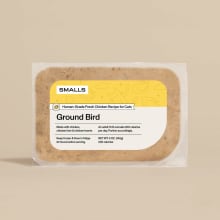 Credit:
Reviewed / Smalls
Credit:
Reviewed / Smalls
Products are chosen independently by our editors. Purchases made through our links may earn us a commission.
-

Smalls Cat Food
Pros
-
Fresh
-
Nutritious
Cons
-
Poor instructions
-
Messy packaging
-
If you have cats, you surely know that they tend to be a particular species; they like routine, they're in charge of initiating pets, and they are picky eaters. I have two cats now—a three-year-old and a four-month-old kitten—so organizing meals that they'll each eat has been a constant effort of trial and error; one that often ends up with my kitten eating both meals because the elder cat doesn't like how it smells.
Though adapting their dinner menu isn't an easy task (it often requires portioning meals differently to introduce new brands), it's worth it when it comes to food brands that have quality ingredients and various flavors. If I were a cat I'd want variety! That said, my cats and I tested out Smalls, a cat food subscription service, for two main reasons: to give my cats nutritious foods and see if I can get them to eat something outside their usual paté.
What is Smalls?

Smalls is a brand making food for cats in a human and dog-focused world.
Smalls is a brand making food for cats in a human and dog-focused world. It's dedicated to providing high-quality human-grade wet and dry cat food that's nutritious, packed with protein, and hydrating. Smalls is only available by subscription and is only sold online as of this article.
What kind of cat food does Smalls sell?
Smalls has two categories of cat food: wet food and freeze-dried food (currently unavailable, but it was available at the time of testing). Smalls' wet food falls into four main categories: Smooth Bird (chicken), Other Bird (turkey), Ground Cow (beef), and Smooth Fish (fish), though the wet foods also contain some vegetables. The brand's freeze-dried food comes in three proteins—Bird (chicken), Other Bird (turkey), and Water Bird (duck)—and is "high in protein, natural micronutrients, antioxidants and phytonutrients." Plus, it's a crunchy alternative to wet foods.
Smalls describes its cat food process simply: "Chop, steam, freeze, ship." The gently cooked meals are packed with protein and nutrients to keep your cat healthy, with shiny fur, less shedding, and improved energy levels. Smalls' wet food lasts about a week in the fridge and up to a year in the freezer. The dry food lasts for 18 months if unopened or about a month once the bag is opened.
What's it like to order from Smalls?
It was easy to build an order from Smalls. I pulled up the website and took the quiz, which asked several questions about each of my cats: their age, weight, build, if they were spayed or neutered, and food texture preferences. The quiz only took a few moments, and resulted in a sampler pack of Smalls cat foods with a free bag of "Catnip n' Chill" treats that was custom-built for my cats.
What my cats and I loved about Smalls

Small's cat food is fresh and nutritious.
It's fresh and nutritious
From the start, I was impressed with how real and nutritious Smalls' cat food was. The turkey recipe especially smelled like turkey meals my family has prepared at Thanksgiving, so I felt confident that I was providing my cats with food that was good for them. I'll also admit that reading the food names brought a smile to my face, though they were a bit confusing. (Does smooth bird describe the protein or the way the food was processed? Both?)
My four-month-old kitten Soba didn't like Smalls at first, but after I mixed it with a can of his usual food he was ravenous. From that point on, Soba ate Smalls food on its own morning and night. My other cat Rayla is three years old and is a picky princess; she turned away anytime I gave her Smalls, even if it was mixed in with her usual canned food.
What my cats and I didn't love about Smalls

There are a few concerns about Small's cat food packaging.
The feeding instructions are confusing
Though I'm happy with Smalls' food and how much my kitten seems to love it, I have strong negative feelings too. For starters, I didn't receive any guidance on how much to feed my cats. I entered both of their names, weights, and ages into the sign-up quiz on the Smalls site, but when the food arrived it was unclear if certain foods were for Soba or Rayla. Because Soba is so young, we have been closely calculating his calories to make sure he eats enough, so the only thing on the Smalls package that helped us do this was the overall caloric count per package, which ended up being 2-3 meals for him.
The packaging is messy and inconvenient
I also dislike the packaging of the wet food. The delivery box was well insulated and the food remained frozen thanks to dry ice. However, once I open a single wet food container I'm left with a thin plastic rectangle that is both messy and unable to be resealed. I ended up storing the partially eaten wet food in the plastic within a Tupperware container to keep it fresh, but it wasn't the most convenient option compared to resealable cans or silicone can covers.
Smalls says that the packing of the wet food is recyclable, but it is made of thin plastic, which is not accepted in most street bins. I could wash and clean the plastic, which felt like a hassle. Plus, any laziness could attract pests into my home or garbage.
What is human-grade cat food?
Pet foods that are human-grade typically mean the food comes from the same place humans get food—like a chicken from the grocery store or beef from a butcher. Smalls says, "The chicken in our food is the same chicken you'd buy at the grocery store for yourself—and the same goes for all our wet and freeze-dried recipes." (Though the brand points out that humans shouldn't eat its cat food.) Smalls' various cat foods are sourced from Canada and the United States and are made in U.S. factories, but the brand's website didn't disclose the specific factories and whether they are human food facilities.
What certifications does Smalls have?

According to Veterinarians.org, Smalls is a great choice for cats.
Smalls cat food claims to use ingredients that are "USDA-certified, humanely-harvested, and sustainably-sourced—no BPAs, preservatives, fillers, or mystery ingredients, ever." A Google search reports that Smalls is USDA and The Association of American Feed Control Officials (AAFCO) certified, but I couldn't find any information on the Smalls website to confirm these claims.
What do vets think of Smalls?
According to Veterinarians.org, Smalls is a great choice for cats. "They do not skimp on their recipes, and their ingredients are responsibly sourced." Further, "Vets recommend that cats have diets that are high in protein and low in carbs." Smalls' cat foods fit this description with USDA-certified protein and vegetable recipes without added fillers or grains.
Should you buy Smalls?

Should you buy Smalls? This depends on your budget and your cat’s level of pickiness.
Maybe, depending on your budget and your cat's level of pickiness.
There's a good chance your cat(s) may love Smalls food—one of mine did! The online quiz was simple, the food arrived quickly, and the wet food certainly seemed high-quality. My cat has been growing steadily for the last few months without any health concerns. I appreciate the various flavors and how customizable the subscription box is too.
But my three-year-old cat couldn't be bothered, so I'd be hesitant to sign up for the service if it really only worked for one of my cats.
Smalls is more expensive than other cat foods—fresh food plans start at $4 per day per cat—(especially canned foods like Fancy Feast or Friskies), but we do a lot for our loved ones, especially the furry ones. And, the price may offset health issues down the road, which makes for happier cats and happier owners.

Smalls' high-quality cat food is packed with nutrients.



